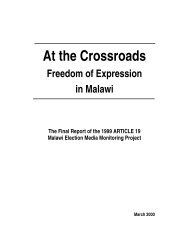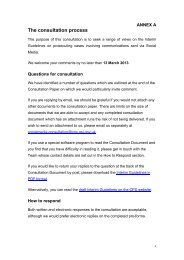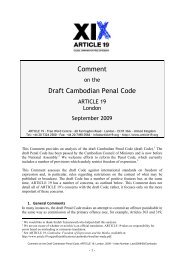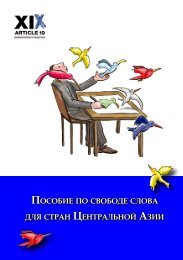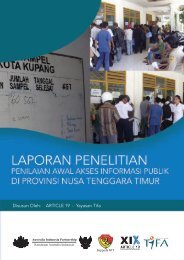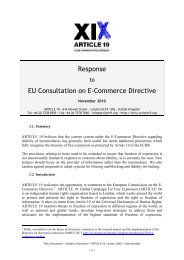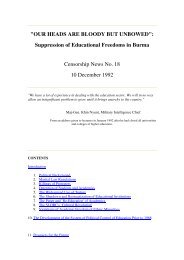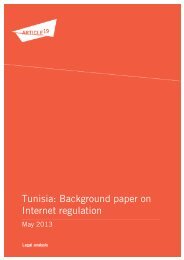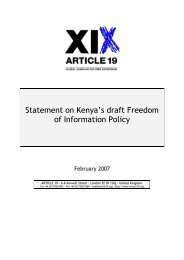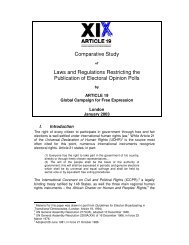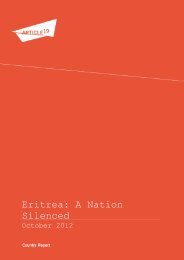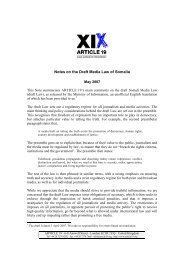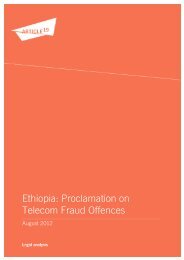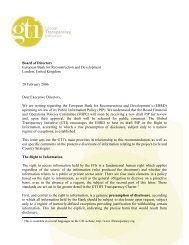FOR INTERNAL USE ONLY - Article 19
FOR INTERNAL USE ONLY - Article 19
FOR INTERNAL USE ONLY - Article 19
- No tags were found...
You also want an ePaper? Increase the reach of your titles
YUMPU automatically turns print PDFs into web optimized ePapers that Google loves.
ARTICLE <strong>19</strong>GLOBAL CAMPAIGN <strong>FOR</strong> FREE EXPRESSIONNGOs interviewed in Lviv noted that most public officials have some familiarity with legalprovisions on access to information, but that they sometimes use this knowledge to obstruct accessrather than to facilitate it. In contrast, NGOs in Donetsk noted that hindrances to the free flow ofinformation were often the result of public officials not being fully aware of their responsibilities andthe local legislation. 308Some of the authorities’ replies were not merely unhelpful, but dismissive and evenpatronising. They reveal that many public officials have little appreciation of the public’s right toknow. For example, a woman from Sloviansk contacted the authorities for information about thefelling of trees for the construction of a car park. She was simply told that the trees were felled legallyand according to approved plans, no details of which were provided. They added that the trees had tobe cut because they were ‘poplars that generated fluff’ and that the areas would be improved by thenew trees being planted. 309NGOs in Lviv noted that public authorities frequently instruct people seeking information torequest documents directly from the originators, such as companies and factories, which, in turn, donot always disclose the relevant information and – importantly – often do not have a legal obligationto disclose information.NGO representatives stated that they believed personal connections were of paramountimportance in obtaining information. As one NGO representative said: ‘The personality factor is thekey issue. If an official dislikes you he won’t provide any information, period.’ Others reported thattheir professional background could be an obstacle. Public officials sometimes seem to find it difficultto relate to NGO representatives or journalists. Officials have sometimes blamed ‘grant-eating’ NGOsand journalists for ‘artificially’ creating problems where none exists. 310According to a number of NGO representatives, some regional and local government officialsthink it wiser not to disclose any information because of their distrust of journalists and NGOs. On theother hand, journalists and NGO representatives might choose to avoid public officials because theseoften perceive them as ‘troublemakers’. 311 Therefore, in order to obtain up-to-date and, even moreimportantly, accurate information, both NGOs and journalists from the three oblasts stated that theyroutinely use personal contacts, which appears to be more effective than using official channels.NGOs in Lviv highlighted the positive results of litigation. Institutions sued several times forillegitimate and untimely release of information tend to improve their performance. In the context of alawsuit against the MEP, one NGO activist remarked: ‘The agency was taught to provide information.308 The Law On Local Self-Government was mentioned.309 Interview with Oleg Listopad, see note 82.310 Separate ARTICLE <strong>19</strong> interview with environmental journalists in Lviv.311 Ibid.For Internal Use Only. Is Post-Chornobyl Ukraine Ready for Access to Environmental Information?ARTICLE <strong>19</strong>, London, 2007((



